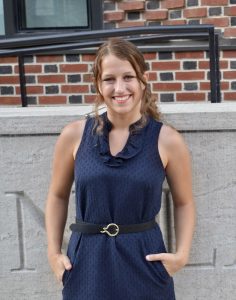In my sophomore year, I switched from being prospectively pre-med to pre-law.
It sounds like quite the jump, but it wasn’t as unexpected as it may seem. I’ve always been interested in psychiatry and brain science; my previous jobs at Penn have all been in the health sector, and I had been on track to be a neuroscience major since freshman year. But, this spring, having participated in mock trial for almost six years, changed my major to criminology, and deemed myself an activist, I knew that I wanted to be speaking out for justice both during and immediately following college.
That’s why I applied to be a summer research assistant at the Quattrone Center for the Fair Administration of Justice—a national criminal justice reform policy hub, housed at Penn Law. My research professor from last summer and beyond, Dr. Dominic Sisti, suggested that I reach out to them in pursuit of fulfilling, meaningful work. I’m very happy to say that I found it.
In my first eight weeks at the Quattrone Center (QC), I was assigned to two primary projects: working with Executive Director Dr. John Hollway in conducting holistic event reviews of criminal justice run-ins with undesired outcomes, as well as surveying police and prosecutors throughout the country under the guidance of Assistant Director Dr. Ross Miller. For the former, I’ve gotten to work on three cases now in various stages of development: amongst them, I was able to analyze crime scene footage, review thousands of pages of legal records through the law school, and write and edit recommendation reports to individuals involved in justice events. Working on the latter project, I called and spoke with hundreds of police departments and district attorneys across the United States—quite literally from New Jersey to Nebraska to California and beyond—surveying them on various issues in policy and procedure. Though my criminal justice work through Penn Career Services lasted until mid-July, I was elated to have been offered a continued position at the QC throughout the remainder of the summer and beyond—into my junior year. Since then, I’ve begun working on more justice event reviews, collaborating closely with a top law firm to uncover the facts of a case that led to a wrongful conviction and incarceration.
Another great part of working at the QC was our weekly “Brown Bag” meetings; in lieu of regular lunch every Thursday, we convened in the Carey Law School to talk about emerging issues in politics and legal studies. It was more than an academic meeting, though, as I also got to engage one-on-one with various law school professors on topics as fun as our favorite fast food joints. Whether we were talking about the SCOTUS decisions of the week or great restaurants in Philadelphia, I was able to learn from and connect with some of the most brilliant minds of Penn Law.
Experiences with a cohort of fellow research assistants also proved to be fruitful throughout these past months. Although I am the only undergraduate student at the QC, the other summer interns (all 1Ls at Penn) truly took me under their wing—giving me insights regarding ‘all things’ law school. We also fostered a rich social community, often exploring the best places for appetizers in Center City after work. I truly feel as though I’ve garnered a host of mentors, whether they be seasoned experts such as Dr. Hollway and Dr. Miller or the wise interns who were in my shoes just a few years ago.
My goal this summer was to explore opportunities in my very interdisciplinary interests (the same that led me from medicine to perhaps medical or criminal law), and I accomplished such. In addition to working at the QC, I’ve gained valuable insights on the intersection between law and neuroscience as a whole in research at the Department of Medical Ethics and Health Policy’s ScattergoodEthics and the Department of Psychology’s EDEN Lab. Drawing upon these two opportunities as well as the incredible months I’ve had at the Quattrone Center, I’m still not sure exactly where I will end up after Penn…but I’m one step closer to finding out.

